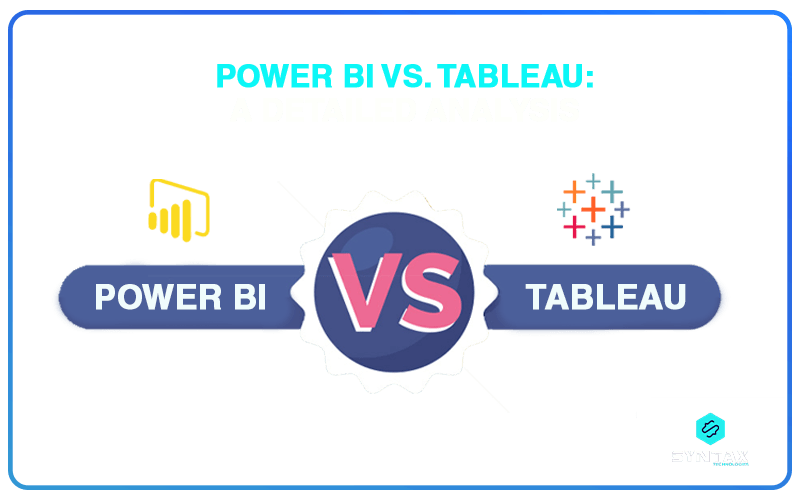?Business Intelligence: Make Quicker and Easier Decisions with Better Data Reporting?
The task of business decision making is not the sole responsibility of a single individual. It involves the collective opinion of multiple stakeholders. However, what basis do these people use in order to arrive at a particular decision? The answer is insights derived from the analysis of data.
Sometimes, these insights may simply be in the form of confusing technical jargon. The different BI Reporting Tools help in presenting them in understandable and visually appealing formats.
Power BI and Tableau happen to be two of those prime Business Intelligence Tools available in the market. Given their cut-throat competition, the issue of Power BI vs Tableau has assumed significant importance over the years.
In this blog, we shall look at the issue of Microsoft Power BI vs Tableau, by undertaking a detailed analysis of each tool and by considering their similarities as well as differences. We will look at the topic of Power BI vs Tableau Pros and Cons as well as compare the two tools with yet another popular platform (QlikView) under the issue of Power BI vs Tableau vs. QlikView.
If you wish to read more on other prominent Business Intelligence Tools available in the market, refer to our blog on ?Top 10 Business Intelligence Tools?
What is Power BI?
It is one of the most popular Open Source Business Intelligence Tools which offers provisions for Data Collection, Data Integration as well as Data Visualization. It can be used for performing Data Analytics for data acquired from cloud or local sources, followed by the publication of reports on the Power BI Platform. It offers services which include data preparation, interactive dashboards (data visualization tableau), visual-based discovery and augmented analytics.
Features of Power BI:
- It is user-friendly and can be used to share reports for free
- It has features like Power Maps, Desktop and Pivot, which can help to share insights even on mobile devices
- Its feature of Power Pivot helps in conducting analytical operations which is easy to operate even more than Excel
- Its feature of Power Query helps in deriving data even from old databases and generate reports
Power BI offers the following products: Power BI Desktop, Power BI Premium, Power BI Pro, Power BI Embedded, Power BI Mobile, Power BI Report Server.
Advantages of Power BI
In this section, we shall look at some of the benefits of Power BI as a BI tool.
- It provides for pre-built dashboards as well as real-time updates on the same
- It provides a secure environment, hybrid configuration and quick deployment
- Data Visualization and Data Exploration
- Expansive database connectivity, along with reliable and secured connection to data sources
- Power Query aids in Data Wrangling and Data Cleaning
- Offers integration with R and Python coding
- It is supported by the benefits of Machine Learning and Artificial Intelligence
What is Tableau?
Tableau is a prominent Data Visualization Tool or Visual Analytics Platform which helps in analyzing and reporting large volumes of data. It not only helps in simplifying data, but also presents it in aesthetically pleasing and comprehensible formats.
Tableau comes with several useful functions which help in the creation of graphs, charts, maps, dashboards and others for the lucid presentation of complex data. Tableau facilitates its usage by people from non-technical backgrounds as it doesn?t necessarily require the knowledge of programming languages for its operation. Consequently, Tableau provides for Data Blending, Data Collaboration as well as Real Time Analytics.
Tableau has become increasingly popular in the field of data science because it allows users to work with large and diverse data sets and quickly identify patterns, trends, and outliers. It also provides a range of advanced analytics features, such as predictive modeling, clustering, and statistical analysis, which are essential for advanced data analysis.
Features of Tableau:
- It provides a simple GUI with easy drag and drop options
- It can be used to share tools and dashboards which can facilitate group analysis
- It can easily be integrated with other applications like Microsoft Excel
- It comes with options of automatically updating data which helps in deriving insights from it in real-time
- It supports Data Visualization and Data Exploration through in-memory architecture
The Tableau family includes the following products: Tableau Public, Tableau Desktop, Tableau Online, Tableau Server and Tableau Reader.
If you wish to read more on Tableau as a Business Intelligence Tool, do read our blog on ?What is Tableau? Learn from the Basics?
Advantages of Tableau
In this section, we shall look at some of the benefits of using Tableau.
- Cost Effective with Plausible Customer Support
- Produces some of the most Impressive and Visually Appealing Data Visualizations
- Provides for Data Exploration and Data Cleaning
- Helps to handle huge volumes of data
- It is extremely User-friendly and generally uses scripting languages like R and Python
- Provides for connectivity with different data sources as well as information stored in Data Warehouses and Cloud
Tableau vs. Power BI: Comparative Analysis
Power BI vs Tableau Pros and Cons
The issue of Power BI vs Tableau can be looked at from different angles. In one sense, it would be reasonable to simply talk about the differences between the two tools. However, one can also undertake an even deeper analysis and consider the issue of Tableau vs. Power BI on the basis of the relative advantage of each over the other.
In this section, which deals with the issue of Power BI vs Tableau Pros and Cons; it is evident that in certain respects, Power BI is better off than Tableau, while in other cases, Tableau has an upper hand.
Power BI vs Tableau vs. QlikView
In this section, we shall undertake a comparative analysis of three popular Business Intelligence Tools ? Power BI vs Tableau vs. QlikView. However, before we proceed with that, let us look at what is QlikView.
QlikView
This has been regarded as a Data Visualization, Self-Service BI and Data Analytics tool. It aims to bring in gains for a business enterprise through providing features like Data Analytics, Data Integration and Data Literacy. It has some unique features like in-memory data processing and patented technology which helps in guaranteeing fast execution of results to the users. It has a simple GUI which comes with easy to use drag and drop features, helping to generate flexible and interactive data visualizations.
Power BI vs Tableau vs. QlikView
Conclusion
By the end of this blog, I am pretty sure that the issue of Tableau vs. Power BI Comparison is not really a straightforward one. There is no one simple answer to the question of which one is better. The choice of a particular tool will depend on various factors including business requirements, budget as well as the nature of the user who will be using the tool.
While Power BI is essentially suited for common stakeholders; Tableau is more likely to be reserved for being used by those with experience in Data Analytics. While Power BI has the advantage of simplicity; Tableau wins in matters of speed and visualization quality. Thus, the Power BI vs Tableau duel is essentially a tie.
Career prospects within the field of Data Analytics and Business Intelligence is soaring at an unprecedented pace. Expertise in these fields requires proficiency in the usage of different BI tools available in the market of which Tableau and Power BI are prominent ones.
We, at Syntax Technologies, provide you with an exciting opportunity to evolve as a Data Analyst and Business Intelligence expert. To know more about our Data Analytics and Business Intelligence course, read here:

